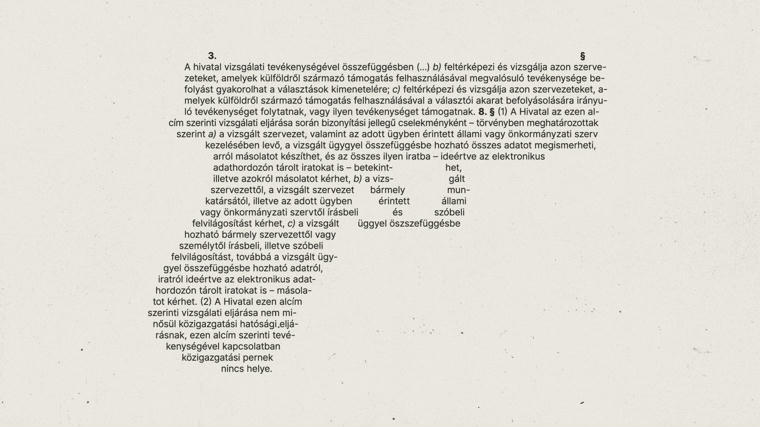Author: Quentin Ariès
In this Central European country, independent cultural and media actors are holding their breath. After a failed attempt this spring, the Hungarian Parliament led by Fidesz, a far-right party, could vote on a bill that would jeopardise their existence.

Hungarian Parliament building at night – © Hannes Flo
Tuesday May 13th, an aggressive bill was submitted in the registry of the iconic Parliament of Budapest, Hungary’s capital. Promised two months before by Prime Minister Viktor Orbán, this attempt is called the “Easter purge” against the “bugs” of Hungarian society—namely independent NGOs and media not fully aligned with and controlled by his party.
Filed by a Fidesz MP, this text was withdrawn due to banks or other federations opposing their roles in this bill. An updated version could be presented after this summer. But even if this proposal could be tweaked or watered down, it is worth taking a close look. This was, and could still be, the ultimate test for Hungary to remain a democracy.
Orbán’s Slow and Steady Takeover
Let’s rewind. Viktor Orbán appeared in Hungarian politics as a liberal student activist at the end of the Soviet-backed regime. Elected Prime Minister in 1998, he then lost elections 4 years later—according to him, because he was not in control of Hungary’s cultural and political narrative. Back in power in 2010 with a comfortable majority to rewrite the Constitution as he wishes, he has since meticulously reshaped all the political and civic life in Hungary.
He did it through hostile takeovers of independent media, new laws and rules for independent NGOs, interventions in the programming of state-controlled cultural institutions or the governance and teaching of universities—and the list is non-exhaustive. This heavy political climate, aimed to control the country’s political and cultural fabric, is also the best way for private companies or organisations to support targets of the government. In a nutshell, in Hungary, there is no level-playing field for independent actors if they are not part of the Fidesz Kraken.
Orbán’s far-right shift accelerated since Russia's full-scale invasion of Ukraine. The government speeded up attacks against the free press, intervened on schools and universities curricula against gender equality, proposed new laws targeting LGBTQIA+ communities, including the ban of the upcoming June 28th Budapest Pride, and delayed EU policies to support Ukraine. Last but least, in late 2023, it created the “Sovereignty Protection Office” meant to smear independent organisations receiving non-Hungarian funding. A body seen as a breach of EU law for the European Commission which triggered legal action against Hungary in late 2024.
This is where this “Easter purge” law comes in.

Protest against homophobic legislation in Budapest, Hungary on June 14th, 2021 – © Pasztilla aka Attila Terbócs
The Last Hungarian Straw
Directly inspired by the “foreign agent law” in Russia or more recently in Georgia, the proposed bill gave teeth to the smearing campaigns of this office. If an organisation or a person is labelled as a threat to Hungary’s sovereignty and receives foreign funds (from EU projects to any foreign transactions in their bank accounts), then it would end up on a list and would be extremely difficult, if not impossible, to operate. Leaders of listed organisations could be publicly forced to disclose their personal accounts. NGOs and media could lose their tax status to receive donations, be fined up to 25 times any funding they receive from abroad or even be forced to close. No appeal was foreseen in the legislation.
This draft law “on the transparency in the public sphere” (you can read a translation here) is considered by scholars as a monumental breach of EU law. Over 320 NGOs and 100 independent media signed calls to withdraw this proposal, while the European commissioner for Justice and Democracy Michael McGrath threatened legal action to the European Court of Justice (once again).
First expected targets included 444.hu, a media member of Sphera Network, a consortium of European independent media led by Médianes and a member of Reset!. “This law is all about shut up or shut down,”says its CEO Gábor Kardos.
Cultural independent players were not specifically mentioned in this bill. Nevertheless, “we are worried” says Kató Somos from Reset! member Art Quarter Budapest (aqb) as “the legislation is so vague that we could become one.” She adds, “and this is what they want, for you to always be afraid.”
Peter Bokor, founder of the music magazine MMN and the community radio Lahmacun, two other Reset! members, agrees. “If their goal was to make us fear, then yes it was a success. It was in our heads, and it still is! [...] The fear is here.” He is also concerned about the potential fines, which he says “would really destroy lives” in a sector where “people sacrifice a lot” and with very little support “to be able to pay fines of this dimension.”
He argues that it was never about transparency. “I don’t have anything to hide, I can show to everyone how little (or no) money we make working in cultural media,” he snarks.
Both emphasised how difficult it already is for their organisations to survive, given that the Hungarian government provides zero funding for independent cultural actors. Their organisations stopped to even bother applying to already rare state funding for the cultural sector.
In this climate, speaking out against this bill is a potential risk. “A smaller player [like us], would not necessarily be on their radar, so they would need to do some detective work,” says Peter Bokor.
But maybe the entire point of this bill was not only to threaten independent players but to be an easy smokescreen. “I often heard that they could not apply it and it was just for the media to be busy with this and not with healthcare, education, or the inflation,” adds Peter Bokor.

© Péter Somogyi (szarvas)/Telex.hu
Changes on the Horizon?
For the first time in more than a decade, the next spring 2026 elections could be surprising. The new centre-right party Tisza is actually leading in the polls. A surge mainly due to the biggest scandal of Orbán’s tenure. Both the President, Katalin Novák and the Minister of Justice, Judit Varga, had to resign after pardoning in autumn 2023 a local Fidesz official who was convicted for his role in a sex abuse cover-up at a children’s home. The pardoning happened as the politician was waiting for an appeal. A story first reported by 444.hu last year. Ironically Tisza was founded by Peter Magyar, a former Fidesz member and former husband of Judit Varga.
But Kató Somos does not hold her hopes up for transformative change if Orbán is thrown out of office. Tisza “remains pretty conservative. They want to change the system but mostly on corruption issues. And of course, that would be very nice ! But besides that, I don’t think too much would change.”
However, both Reset! members' representatives are adamant that Hungary's independent cultural sector is strongly European.
Building bridges between cultural organisations is a must for aqb. “Collaborations matter a lot” as the art centre is part of Creative Europe projects. “This helps for our survival. Actually, this is our only chance of survival” says Kató Somos.
Even if living in a far-right country does not help. ”It has happened when I'm abroad, for instance representing artists at art fairs, when some people see we are Hungarians, I can feel that they are suspicious, do not want to connect because our government is antidemocratic.”
“No matter what our government does, it doesn't mean that all Hungarians are on the same page,” she adds. In an interesting twist, the draft bill could backfire. Orbán’s polls have not improved and Hungarians appear to oppose the bill. “We do see elevated levels of engagement in our subscription and of our voluntary donation programmes,” explains Gábor Kardos.
From Europe and beyond, Peter Bokor believes in a “practical solidarity”, with structures like Reset! to engage in advocacy campaigns, or in setting up working groups dedicated to the consequences of the democratic backsliding on the independent cultural sector.
Nevertheless, this support should go even further. Peter Bokor advocates for European policymakers to create pathways or proxies to guarantee that cultural organisations in illiberal countries could continue receiving European funding even if their own governments are against them.
“It is not just asking for Hungary,” he adds. “We need such tools as a blueprint so that they can be quickly adjusted and applied in countries where things shift in unfavourable ways.”

Lahmaszter ’23, BumBék in the Lahmacun Radio Studio in Budapest — © Gergő Manhertz
However, there might be an opening. No doubt that European institutions —which are pitching themselves as the last defenders of democracy globally—would be under pressure to engage in such schemes if this bill becomes a law in September. Sphera has launched its own campaign for emergency financial and legal support if the law is implemented.
Also, as the EU will soon start drafting and discussing its upcoming financial framework for 2028-2034, such schemes offering greater protection to EU funds beneficiaries could be trialled. Watch this space.
To go further:
"Hungary: Foreign funding bill poses most serious threat to independent media in years", Media Freedom Rapid Response, May 16th, 2025
"Assessing Hungary’s foreign funding bill", Media Freedom Rapid Response, May 28th, 2025
Published on June 24th, 2025
About the author:
Quentin Ariès is a Brussels-based reporter. Now a freelance reporter and editorial adviser at Médianes, he was from 2022 to spring 2025 the Editor-in-Chief of Sphera, a European network of independent media and cultural actors to co-produce videos, podcasts and newsletters for socially-engaged young Europeans. Previously, he wrote for The Washington Post, POLITICO Europe and Contexte. He was shortlisted in 2019 at the Fetisov International Journalism Award for his investigation into media capture in Hungary and he teaches European journalism in French and Belgian universities and journalism schools.